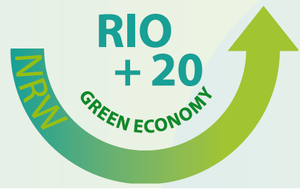
Civil society in North-Rhine Westphalia and the Rio+20/Green Economy discussions: CSCP publishes new report
The upcoming United Nations Conference on Sustainable Development, taking place in Rio in June 2012 (therefore called “Rio+20”) is the occasion to discuss sustainability issues not only at the international but also at the regional level. This is also the case in the German State of North Rhine-Westphalia (NRW), where the topic of Rio+20 and “green economy” as one of the conference’s central themes have been and are still very lively discussed.
In order to learn more about the positions and wishes of civil society actors in the region, the CSCP interviewed 32 representatives of NGOs and scientific institutions in NRW to learn about their opinion and activities related to the Rio+20 process and topics. Preliminary results of this qualitative survey have been subject of a workshop organized in Düsseldorf at the Ministry for Climate Protection, Environment, Agriculture, Nature Conservation and Consumer Protection of North Rhine-Westphalia on February 10th. At this occasion, 40 participants, mainly civil society representatives and politicians, discussed the findings and developed new ideas concerning the Rio+20 process and implementation at local level. Additionally, possibilities for developing common activities on Rio+20 issues and establishing further partnerships were in the focus.
Concrete key messages from actors in NRW included:
- | Civil society actors in NRW expect from governments concrete and binding results of the Rio+20 conference, including specific indicators. |
- | The concept of “green economy” should be clearly defined and its intrinsic conflict of objectives be discussed, in order to avoid neglecting social issues in favor of economical ones. |
- | For issues regarding sustainability at a regional level and for an NRW- strategy on sustainability, a consistent approach has to be established. Various sector strategies should be integrated into one common, ambitious sustainability strategy. |
- | Linkages between various levels of action (international, national and regional) should be clearly shown and reinforced. |
- | In order to put the contents of Rio+20 conference in a binding way at municipal level, the “local Agenda 21 groups” have to be addressed with new challenges and motivations. |
- | Discussions have to be carried on within Europe and worldwide to develop an understanding of sustainable lifestyles. To promote a change in NRW, communication strategies should address people explaining the gains and advantages of living more sustainably. |
- | Addressing new audiences and spreading new ideas among the population could be part of an educational action for sustainability that could use alternative learning approaches (e.g. learning by doing, non-formal learning). |
More details to these and other key messages gathered by the project "Global denken - Lokal handeln in NRW" have been summarized in a report. The project was financially supported by the Ministry for Climate Protection, Environment, Agriculture, Nature Conservation and Consumer Protection of the German State of North Rhine-Westphalia.
To read the full project report (in German), click here.
